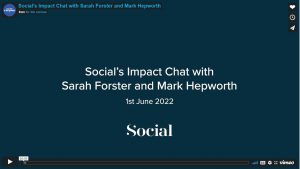For this month’s Social Invest Impact Chat, our director Luke Cross spoke to Sarah Forster and Mark Hepworth, co-founders of The Good Economy.
Below are some of the key moments from our impact chat – but you can listen to the session in its entirety by clicking the link above.
Investors must do away with short-term thinking
Sarah and Mark highlighted the importance of long-term planning when it comes to ESG and impact investing.
Conversations they have with investment teams are becoming more detailed as investors start to consider the individuals who are impacted by their investments. As Sarah puts it, they are “coming away from their spreadsheets”.
Longer-term thinking is better for everyone, says Mark. “I think in the long run it is better for investors to have a more stable economy, and climate change and inequality are very big threats to this.”
Impact must be communicated clearly
The impact chat looked at the issue of greenwashing and impact washing and how this can be avoided. For Sarah and Mark it is all about communicating your aims clearly.
As Mark explains: “It matters how we talk to each other about impact – I get quite impatient with the amount of loose terminology used.
“We have got to stop creating a slippery surface because otherwise we will be accused of impact washing.”
As ESG and impact reporting has grown in popularity, so to have questions around its efficacy. Being clear and transparent with investors and other stakeholders will be vital going forward.
ESG is being driven by public awareness
The Good Economy spearheaded the creation of the Sustainability Reporting Standard for Social Housing (SRS). This standard seeks to capitalise on increased investor interest in the ESG agenda, which Sarah says is ultimately being driven by individuals.
“We are seeing cultural behavioural shifts in the market,” Sarah tells us. “I do think the investment sector is going to mirror the times and culture around us. And I think there is genuine concern from government, individuals and corporations.”
Harness interest at a local level
If ESG and impact investing is done well and communicated clearly, it can tap into widespread interest in how finance can be harnessed and used to improve social outcomes.
This sentiment is something that Mark says he has noticed at a local level. He says: “I’m detecting this new rising tide of interest at local government level. I see the beginnings of a groundswell of enthusiasm.”
Achieving buy-in at a local level can bring ESG closer to individuals and prevent it from being seen merely as a tool used by financial institutions.
Place-based impact investing can regenerate the country
In May 2021, The Good Economy published a white paper on place-based impact investment, which has been well-received according to Mark.
This white paper is key to The Good Economy’s philosophy and the organisation sees this model as the way the government can regenerate the country, especially given its Levelling Up agenda.
“It is essentially, the route to regenerating the country,” says Mark. “I think we need a bottom up approach and for investors to come out of the city and see what reality looks like.”
Investors are becoming more and more interested in this type of investment and The Good Economy is currently working on a number of pilot projects to put this method into action.
Click here to listen to the full discussion
- Read more about the place-based impact investing initiative here.
- To sign up to Social Invest’s monthly newsletter and other updates and events, click here



